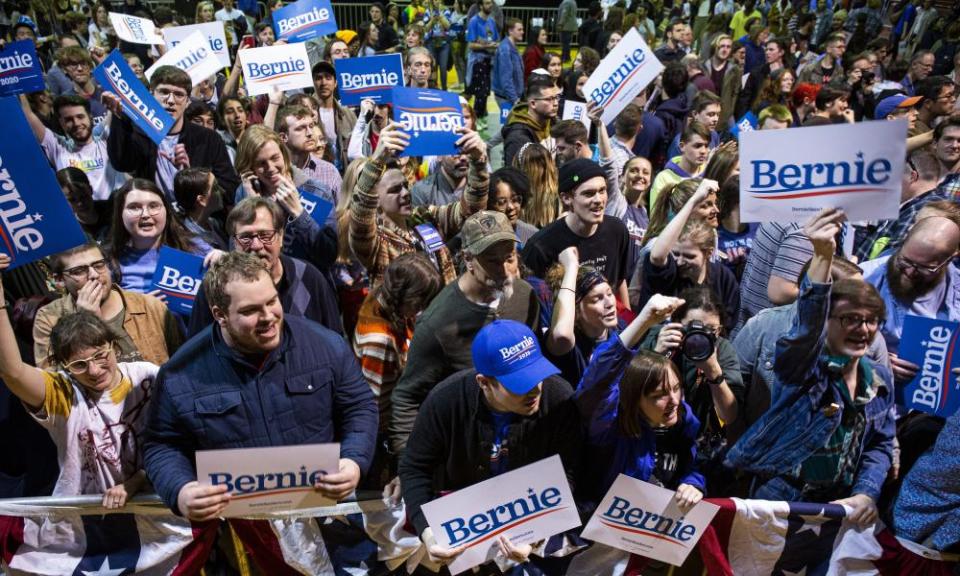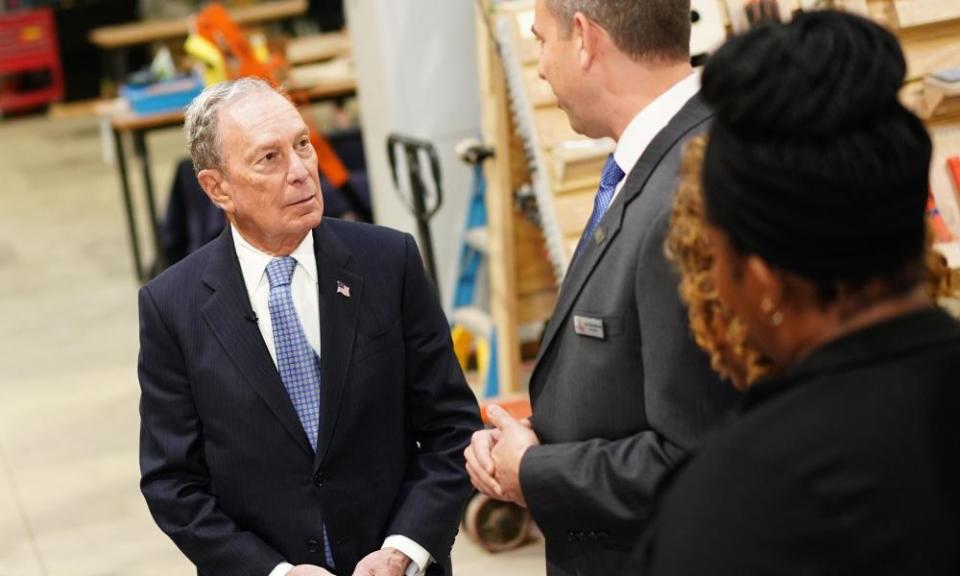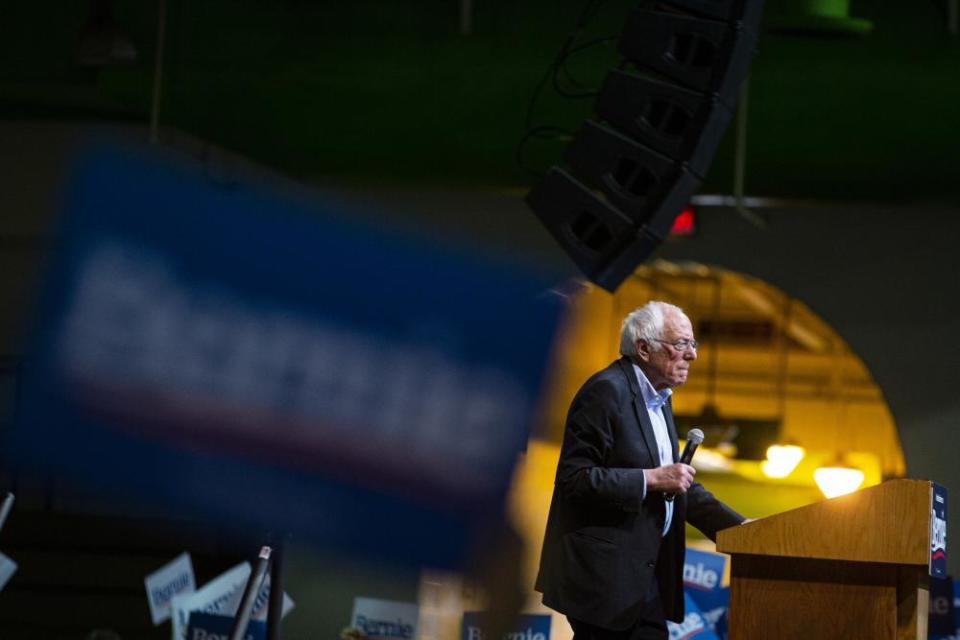Sanders hopes to ride 'blue wave' to victory in Virginia on Super Tuesday

On a crisp weekday afternoon before the Virginia primary on Super Tuesday, thousands of people turned out to see the Democratic presidential candidate Bernie Sanders speak in the state’s capital, Richmond.
Four years ago, Democratic voters in the commonwealth delivered a resounding rebuke of the Vermont senator’s promise for political revolution. But there are signs that this year might be different.
After strong showings in the early primary voting states of Iowa, New Hampshire and Nevada, Sanders stood before an adoring crowdat the Arthur Ashe Athletic Center, a shock of white hair against a sea of blue placards bearing his name, as the clear frontrunner for the Democratic presidential nomination. Interest in the rally was so overwhelming that the campaign relocated to a larger venue.
“That is getting the establishment very, very nervous,” he said, gleefully conjuring images of a cabal of Democrats desperately searching for a way to slow his march. “They’re staying up day and night trying to figure out how to stop us. And when they see turnout like this, they get even more nervous.”
Related: Why Bernie Sanders won the week in US politics – and Mike Pence lost
Sanders wasn’t exaggerating. That morning, the New York Times published a report based on interviews with dozens of Democratic Party officials who said they would attempt to block his nomination at the party’s convention in July if Sanders arrived with the most delegates but fell short of a majority needed to win the nomination outright.
It’s the day when the greatest number of US states cast their votes to nominate presidential candidates, who will eventually compete for the White House in November’s general election.
It is the biggest day in the US election calendar apart from election day itself. The candidates have each held hundreds of meet-and-greet events, travelled thousands of miles, eaten a lot of junk food, and their campaigns have spent hundreds of millions of dollars to get them to this make-or-break moment.
In 2020, Super Tuesday falls on 3 March. Both Democrats and Republicans will be voting, but because Donald Trump does not face any serious challengers, all eyes will be on the Democratic contest.
The early voting states – Iowa, New Hampshire, Nevada and South Carolina – have all had their say over the past month, with Bernie Sanders emerging as the possible national frontrunner in the race for the Democratic nomination.
But now, 14 states across the country – Alabama, Arkansas, California, Colorado, Maine, Massachusetts, Minnesota, North Carolina, Oklahoma, Tennessee, Texas, Utah, Vermont, and Virginia – as well as one US territory (American Samoa) and Democrats abroad will cast their votes on the same day.
With so much uncertainty around the mechanics – and the mathematics – of the nomination process, Sanders is dedicating precious time to competing for Virginia’s 99 delegates before Tuesday’s slate of primary contests, when 16 states and US territories will have their say on which of the eight major remaining candidates should take on Donald Trump in the November election.
On Saturday, as South Carolina holds its primary, Sanders will return for events in northern Virginia, where he will appear with the Minnesota congresswoman Ilhan Omar, and Virginia Beach.
Powered by moderate, suburban voters, Virginia has become increasingly Democratic since the election of Trump. In 2017, Virginia elected a Democratic governor, Ralph Northam, in the first major test of the depth of antipathy to Trump in suburban America. In 2018, Virginia Democrats flipped three congressional seats critical to the party’s takeover of the US House. And in 2019, Democrats gained control of both chambers of the state legislature for the first time in a generation.
A tradition-bound, business-friendly southern state isn’t an obvious fit for a democratic socialist senator from Vermont. In the 2017 Democratic gubernatorial primary, Northam handily beat the former congressman Tom Perriello, who ran as a progressive with Sanders’s endorsement.
But a Monmouth University poll from last week showed Sanders neck-and-neck with Michael Bloomberg, the billionaire former New York mayor who will appear on the ballot for the first time on Tuesday after foregoing the early-state contests. Virginia is a top target for Bloomberg, who launched his campaign in Norfolk and has blanketed the state with millions of dollars worth of political advertisements.

“Mike Bloomberg has visited Virginia more than any other Super Tuesday state because of the importance our Commonwealth has in our overall strategy,” said Melissa Gallahan, Bloomberg’s 2020 Virginia state director. “With more than 80 staffers on the ground, seven offices open across the Commonwealth, and an unmatched field program, our campaign has been putting in the work to reach out to every voter in Virginia.”
“In some ways you could say Virginia is a battle for the soul of the Democratic party,” said Bill Neidhardt, Sanders’s Virginia state director, who previously served as the campaign’s deputy state director in Iowa.
“Bloomberg is trying to buy this election by basically flooding the state with as much money as possible,” he said. “But we’ve had hundreds, if not thousands, of volunteers who have been organizing here relentlessly for months … These two distinct models are about as far apart as it can get in the Democratic party. Which one can win here?”
But the race is not a neat showdown between Sanders and Bloomberg. The former vice-president Joe Biden is also a major force in the state. On Friday, he was endorsed by the Virginia senator Tim Kaine and he will hold a rally in Norfolk on Sunday. A new poll on Friday showed Biden regaining momentum as Sanders slipped to second, underscoring the uncertainty of the primary.
The primaries and caucuses are a series of contests, in all 50 US states plus Washington DC and US territories, by which the party selects its presidential nominee.
The goal for the candidates is to amass a majority of pledged delegates whose job it is to nominate the candidate at the party’s convention. In all states, delegates are awarded proportionally among top vote-winners.
To become the Democratic presidential nominee on the first ballot, the candidate must secure 1,991 pledged delegates.
So far, less than 5% of delegates have been allotted, but on Super Tuesday, more than a third of available delegates are up for grabs – giving it the potential to propel one candidate to frontrunner status, and prompt others who perform badly to quit the race.
California has the most pledged delegates (494) followed by Texas (261), North Carolina (72) and Virginia (65).
The Super Tuesday states also represent a much broader sweep of the US population, not just in terms of geography, but demographics too, than the early voting states. The results will therefore give a more detailed picture of who supports the candidates, and what their chances of winning on a national level may be.
In the survey by Christopher Newport University’s Wason Center for Public Policy, 22% of Democratic voters said they preferred Biden compared with 17% who chose Sanders. Bloomberg trailed in third place with 13%. A strong showing in South Carolina on Saturday could boost Biden’s standing further, particularly with African American voters.
The survey also reflected the unease many Virginia Democrats feel about Sanders, averse to his populist policies or worrying that they will repel independent and moderate Republicans in crucial swing states in the general election on 3 November. Of the 18% of respondents who said they were uncertain or would definitely not support the party’s nominee if their candidate did not win, two-thirds said they were concerned the nominee might be “too liberal”.
This small slice of the Democratic electorate will be decisive in determining not only if the party carries Virginia in November but if congresswomen like Elaine Luria and Abigail Spanberger, who flipped Republican-held seats in 2018, are re-elected in November, said Larry Sabato, director of the Center for Politics at the University of Virginia.
“Democrats cannot assume anything about Virginia,” Sabato cautioned, adding: “The candidate matters.”
Already, Republican groups are targeting the once deeply conservative Virginia districts held by Luria, Spanberger and Jennifer Wexton in an effort to tie the freshman Democrats to Sanders and other leftwing members of the party such as the New York congresswoman Alexandria Ocasio-Cortez.
Related: Don't call Elizabeth Warren's campaign dead yet | Moira Donegan
Luria endorsed Biden last month, along with other freshman moderates who have raised concerns about the down-ballot risk of nominating Sanders. In a statement, she said the former vice-president would “defeat Donald Trump and win in tough districts like mine”.
More Virginia Democrats are likely to take sides in the final days before the primary. But, as has happened in other contests, the establishment is fractured among the many moderates still in the race, leaving an opening for Sanders to do well in a state that should be fertile ground for his rivals.

In Virginia, voters of either party can cast ballots in the primary and there are indications that there could be more Republicans who participate this year than in 2016. Sanders, an independent senator, and Bloomberg, who was elected mayor of New York as a Republican and an independent, both see an opportunity to appeal to a crossover of disaffected voters.
The Sanders campaign is targeting the state’s growing immigrant communities, with an emphasis on turning out Muslim and Hispanic voters. They are also hoping to tap into the populist, anti-establishment streak that runs through the Appalachian corner of the state.
There are currently eight leading Democratic presidential candidates: former vice president Joe Biden, senators Bernie Sanders, Elizabeth Warren and Amy Klobuchar, former mayors Mike Bloomberg and Pete Buttigieg, billionaire philanthropist Tom Steyer and Hawaii congresswoman Tulsi Gabbard.
Sanders and Warren are on the progressive side of the party, while candidates like Biden, Klobuchar, Bloomberg and Buttigieg are regarded as more moderate.
Super Tuesday will be the first time that Bloomberg will be on the ballot, and will be a key test of whether the hundreds of millions of dollars he has invested in his own campaign have paid off. He controversially skipped the first early voting states to concentrate on winning support in larger, delegate heavy states.
Bloomberg has the largest staff in the state with seven offices and 80 members of staff on the ground. In visits, Bloomberg has presented himself to Virginia as a political pragmatist whose prolific spending on candidates in 2018 and 2019 played a role in Democratic victories across the state.
Virginia unlocks only a fraction of the more than 1,300 pledged delegates up for grabs on Super Tuesday. But in the rare event that no candidate wins the nomination outright, every delegate could matter.
The Virginia delegate Lee Carter, a former marine who defeated the Republican House majority whip to win his seat in 2017 and identifies as a Democratic socialist, believes Sanders has every reason to be optimistic about his standing in the state.
“If people have the choice between a halfway Republican and a whole Republican, they’re going to pick the whole Republican,” Carter said, as the rally emptied on Thursday. “But if you give them the choice between a Republican who is unabashedly fighting for corporate interests and a Democrat like Bernie Sanders who is unabashedly fighting for the people’s interest, the people are going to show up to vote.”

